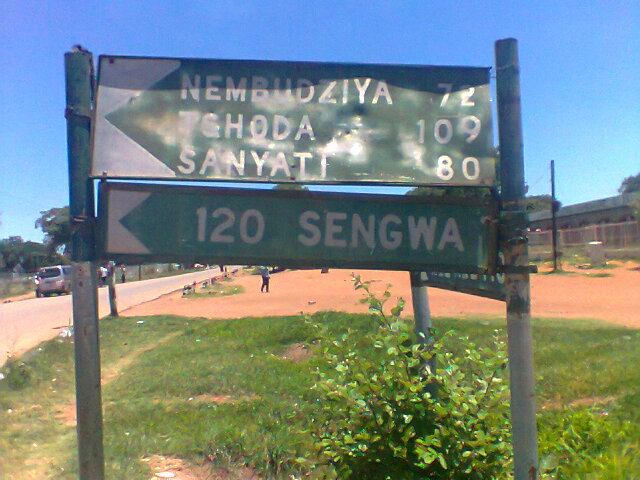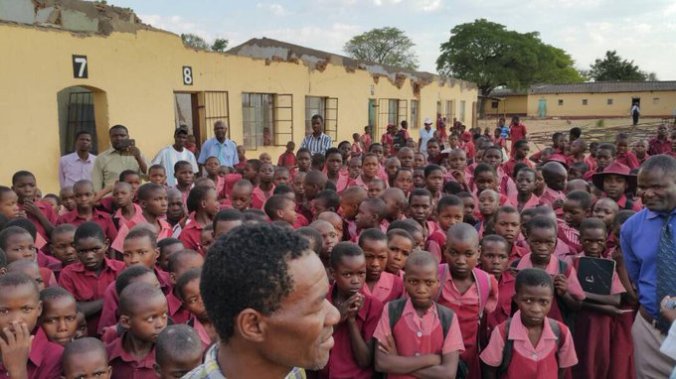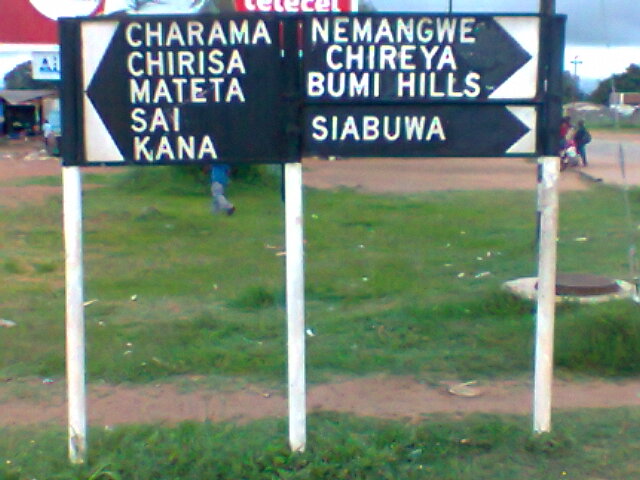
AYA ndiwo mashura ekupedzisira!
Tafadzwa Makore, kamwana kekuGokwe kane mwedzi mishanu yekuzvarwa, kanonzi kakatorwa neshiri apo kainge kakarariswa mumunda vabereki vako vachisakura, ndokubhururukwa nako mudenga kasati kadonhedzwa. Hembe yakainge kakapfeka yakaendwa nayo neshiri ikazonosiiwa yakakochekera paminzwa mumuti wemuunga.
Mashura akaitika kuChinyenyetu, kwaShe Makore, aya asiya vabereki vaTafadzwa nevemunharaunda vazere nekushamisika sezvo mwana uyu akatakurwa neshiri apo ainge arere pedyo naamai vake avo vaisakura mumunda wemapfunde ndokuzodonhedzwa ambobhururukwa naye kwechinhambwe chemamita angaita 100.
Mumiriri weGokwe Nembudziya mudare reNational Assembly, Cde Justice Mayor Wadyajena, vakatsinhira nyaya iyi, iyo yakaitika kwaSabhuku Makore vachiti yakavashamisa zvikuru.
“Kune zvakawanda zvinoitika kunharaunda yangu, mwana akatorwa nekashiri kadiki, kune zvimwe zvakawanda,” vakadaro Cde Wadyajena.
Mukubuda kwenyaya iyi, zvinonzi mwana uyu svondo rapera akatakurwa nekashiri kaduku kachishandisa makumbo ako ndokuendwa naye mudenga.
Chiri kushamisa veruzhinji uku ndechekuti mwana uyu, uyo anogona kurema makgs mashanu, akatakurwa sei nekashiri kadiki ako kanonzi ndekerudzi rwenjiyo kana kuti jirochiro.
Njiyo yakada kuita senhengure asi iri diki pane njiva.
Njiyo iyi inonzi yakabhururuka naTafadzwa chinhambwe chingaite mamita 50 kubva pasi kuenda mudenga ndokuzobhururuka zvakare naye kwemamita isati yamudonhedzera pasi.
Shiri iyi inonzi yakambosara nehembe yainge yakapfekwa naTafadzwa ndokuzoidonhedzera mumuti wemuunga uri chinhambwe chipfupi kubva pamunda.
Pakashanyirwa nzvimbo iyi neKwayedza nemusi weChishanu svondo rapera, vatori venhau vakawana kahembe kemwana uyu kachiri mumuti makakasiiwa umu.
Baba naamai vemwana uyu, Cosmas Makore Kuyana (26) naBarbra Nzou (22) havana nguva yakareba vawanana.
Barbra anoti mwana uyu akatorwa neshiri apo iye aisakura mumunda.
“Ndaisakura ndakamufukidza neamburera apo kwakaita yainge mhepo yaiva nesimba.
‘‘Pandakada kutarisa amburera yandainge ndakamufukidza nayo zuva ndichiti zvimwe ingapupurutswe, ndipo pandakaona shiri iyi yatova nemwana mudenga, akatarisa pasi iyo yakamubata nekumusana, yatova mudenga nepamusoro pemiti.
“Ndakatanga kuchema ndichitevera shiri iyi nepasi ndichishevedzera kune vamwe vaisakura mumunda uri padyo newedu. Shiri yaiva yerudzi rwenjiyo iyo yakangofanana nenhengure.
“Yakazorega mwana uyu apo yakasara yakabata jaketi rake, mwana ndokusvikorovera pasi ndikati mwana wangu afa,” akadaro Barbra.
Anoti paakasvika pamwana uyu, akasvikomuwana akatibikira nekumeso ndokumusimudza akaona akazara mavhu kumeso nekudumbu asi asina maronda.
“Ndakanhonga mwana ndokushamiswa zvikuru kuwana asina kana vanga, aitonyemwerera. Ndakamubvisa mavhu apo vavakidzani vepamunda wangu vakauyawo kuzozvionera.
‘‘Murume wangu naamwene vangu vakazouyawo mushure mechinguvana apo vakaudzwa ndokusvikoona mashura aya tese,” akadaro.
Mudzimai uyu anoti shiri iyi yakaenda nejaketi remwana wake ndokusvikotanga kuchema ichitenderera pamusoro pemiti yaiva mudhunduru pamunda uyu ndokuzoridonhedzera mumuunga.
“Inini naamai vepamunda wakavambirana newedu, Mai Emily Majiya (42), murume wangu, naamwene vangu Easther Kuyana (62) takavhundutswa zvikuru ndokutevera kwaiva kwaenda neshiri iyi ndokunoona jaketi remwana riri mumuti umo takasiya ririmo.
‘‘Takazoenda nemwana kumasowe uko akatanga kubatsirwa kusvika izvozvi,” akadaro Barbra.
Anoti jaketi iri rakaitirwa munamato kumasowe uku uye rakanzi rimbosiiwa riri mumuti umu.
Barbra, uyo akawanikwa ari kumasowe, anoti iye nemurume wake vave kutya kudzokera kumunda kwavo.
“Ndakamboita dambudziko apo ndaiva nenhumbu yemwana uyu, yaiomarara kuita sendaiva ndakaiswa matombo mudumbu asi ndakasununguka zvakanaka.”
Barbra anoti mwana uyu ndewechipiri kubva pane mumwe mukuru waakaita nemumwewo murume waaimbova naye kare asati aroorwa naCosmas.
Cosmas anotiwo ave kugara achitya.
“Chinonyanya kundityisa ndechekuti mwana uyu asati atorwa neshiri, kune imwewo shiri yakangofanana naiyoyi, iyo yakambopinda mumba maiva navadzimai vangu nemwana ndokuguma yava mubhegi rembatya dzemwana. Yakazotora vhesi remwana iro yakaenda naro ndokunorisiya pachisuvi chehozi, ichibva yaenda,” akadaro.
Anotizve mudzimai wake akamboonawo mupurwa uchiyamwa mombe yemudanga mavo, inova nyaya yavanoti yakanga yamboporofitwa kuchechi kwavo.
Asi kune dzimwe nzvimbo, mupurwa unozivikanwa nekuyamwa mombe izvo zvinoita kuti vamwe vaudaidze kuti “gama mombe”.
“Kunze kwemupurwa, vadzimai vangu vakamboona mbeva kumba kwedu iyo vakatandanisa asi yaireba muswe ichitiza,” akadaro.
Cosmas anoti chimwe chinovashamisa ndechekuti mwana uyu kana varere usiku ari pakati pavo anosandudzira amai vake nemakumbo kubva pamubhedha vachiwira pasi.
Mhuri iyi yave kugara kusowe reEsnai rinotungamirirwa naMadzibaba Masimba Machaka (25) uko vakanopotera.
Barbra anonzi akamboita bofu kwemazuva nguva pfupi yadarika akazonamatirwa ndokutanga kuona zvekare.
“Matambudziko edu awanda, mudzimai wangu akamboita bofu zvatisina kunzwisisa, zvino apa mwana ave kutakurwa nekashiri.”
Anoti nemusi weChina chadarika vakaona zvakare nyoka inotyisa mumba mavo, iyo yavanofungira kuti indara asi vakazoiuraya.
Mumwe wevakaona mwana uyu achitakurwa neshiri, Mai Majiya, vanoti kana kudzokerawo kumunda kwavo vave kutya.
“Ndaiva mumunda mangu apo ndakanzwa vachichema vachiti ‘mwana wangu kani aenda neshiri’. Ndakamhanya nemwana wangu ndokunoona mashura aya,” vakadaro.
Zvakadaro, Ishe Makore, VaSolomon Makore, vanoti vari kuronga kutsvaga maporofita ekuti abatsire panyaya iyi pamwe chete nekuchenura dunhu ravo.
Muporofita ari kubatsira mhuri iyi, Madzibaba Machaka (25), anoti mwana uyu haana kutakurwa neshiri chaiyo asi kuti aya mabasa ehuroyi.
“Izvi zvaingova mumaziso aamai vemwana uyu chete nevamwe, yaisava shiri asi mhando dzemishonga yekunze kana chidhoma.
‘‘Hazvina dambudziko, anorarama zvake mwana uyu nemuteuro wedu,” akadaro muporofita uyu.
Anoti mhuri iyi yakataurirwa kare pamweya kuti yainge yakatarisana nerufu pamusha payo.
“Zvose zvakazoitika kumwana uyu nezvekuita bofu kwaamai ava, kuona mupurwa waiyamwa mombe, zvembeva yaireba muswe nezvimwe zvakanga zvakataurwa kare nemweya,” akadaro.
Madzibaba Canaan Goodzi (53), avo vanova musadare pakereke iyi, vanoti vari kugara vachienda sechechi kunoita munamato kumba kwemhuri iyi.
Mumwe mudzimai wepasowe iri, Memory Nzou (28), anoti nyaya iyi inotyisa zvikuru.
Never Makore (47), mukoma wababa vemwana wekutorwa neshiri, anoti vakazoshevedzwa nyaya iyi yaitika.
“Ichi chiitiko chekutanga mumhuri medu. Tiri vakomana vasere nemusikana mumwe chete, baba vedu vakafa tasara naamai uye tiri kunzwa kutya kukuru,” akadaro. Vamwene vaBarbra, Mai Kuyana, vanoti vashaya zano nenyaya iyi. “Handichaziva kwekutarisa, ndakavhundutswa zvikuru.”
Tinashe Kuyana (31), mukoma waCosmas zvakare, anoti anofungira kuti aya mabasa ehuroyi ari kuitwa nevehukama.
“Tapera kufa pasina kurwara, pane imwe nhamo pakatomborwiwa tichinangana huroyi,” akadaro Tinashe.
KWAEDZA


 A daring 24-year old man from Gokwe allegedly impregnated his 66-year-old grandmother. Normore Mudavanhu is the talk of the village for getting Sazini Dube, his maternal grandmother, pregnant. If the baby is born that means it will become his mother’s younger sister.
A daring 24-year old man from Gokwe allegedly impregnated his 66-year-old grandmother. Normore Mudavanhu is the talk of the village for getting Sazini Dube, his maternal grandmother, pregnant. If the baby is born that means it will become his mother’s younger sister.




 The continued fall of cotton prices on the international market has left hundreds of families in Gokwe whose lives depend on the crop wallowing in poverty.
The continued fall of cotton prices on the international market has left hundreds of families in Gokwe whose lives depend on the crop wallowing in poverty.